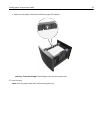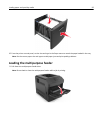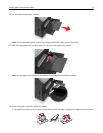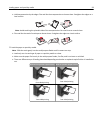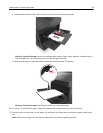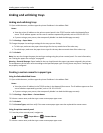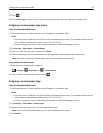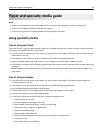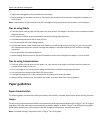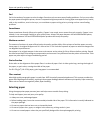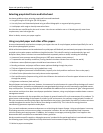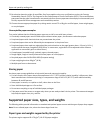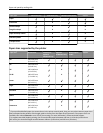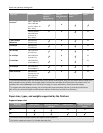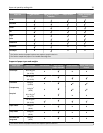
Paper and specialty media guide
Notes:
• Make sure the paper size, type, and weight are set correctly on the computer or printer control panel.
• Flex, fan and straighten specialty media before loading it.
• The printer may print at a reduced speed to prevent damage to the fuser.
Using specialty media
Tips on using card stock
Card stock is heavy, single‑ply specialty media. Many of its variable characteristics, such as moisture content, thickness,
and texture, can significantly affect print quality.
• From the printer control panel, set the paper size, type, texture, and weight in the Paper menu to match the card
stock loaded in the tray.
• Print samples on the card stock being considered for use before buying large quantities.
• Specify the paper texture and weight from the tray settings to match the paper loaded in the tray.
• Preprinting, perforation, and creasing may significantly affect the print quality and cause jams or other paper feed
problems.
• Before loading the card stock on the tray, flex and fan the card stock to loosen them. Straighten the edges on a
level surface.
Tips on using envelopes
• From the printer control panel, set the paper size, type, texture, and weight in the Paper menu to match the
envelopes loaded in the tray.
• Print samples on the envelopes being considered for use before buying large quantities.
• Use envelopes designed specifically for laser printers.
• For best performance, use envelopes made from 90‑g/m
2
(24‑lb) paper or 25% cotton.
• Use only new envelopes from undamaged packages.
• To optimize performance and minimize jams, do not use envelopes that:
– Have excessive curl or twist.
– Are stuck together or damaged in any way.
– Have windows, holes, perforations, cutouts, or embossing.
– Have metal clasps, string ties, or folding bars.
– Have an interlocking design.
– Have postage stamps attached.
– Have any exposed adhesive when the flap is in the sealed or closed position.
– Have bent corners.
– Have rough, cockle, or laid finishes.
Paper and specialty media guide 63



